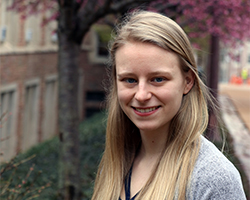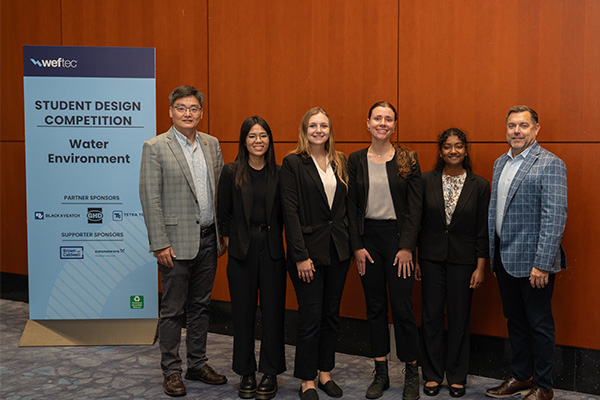Infinity and beyond
WU Rocketry team members work together to build rockets and educate others on the science of flight
The members of the WU Rocketry team at the McKelvey School of Engineering are doing much more than just building a rocket.
Established at McKelvey Engineering in 2019, the organization aims to take part in the annual NASA Student Launch, a national competition that challenges students to design, manufacture and build a rocket that can reach a height of 1 mile and release a payload during landing.
Beyond the flight, however, teams also had to curate a strong social media presence as well as provide outreach and learning opportunities to a minimum of 200 K-12 students.
That's a daunting challenge, especially since WU Rocketry is a such a young team. The majority of group members are first-year or sophomore students, and nearly half are new to the team. That means before the team could even get started on their rocket, everyone had to be caught up on the science behind it.
“The first thing we did was start off the semester with a ‘basics of rocketry’ presentation in order to get everyone on the same page so we could all have the same terms to use when designing the rockets,” said Caitlind Walker, a junior majoring in electrical engineering and founder of WU Rocketry.
The main team is made up of four sub-teams — recover and propulsion; structures, and payload and avionics — that also work to further expand students’ knowledge.
“Students don't need to know the details of things outside of their sub-team, but they should know how everything should operate,” Walker said. “I find every person a specific, dedicated mentor who could answer all their questions. This was often the sub-team lead but could be somebody else who had more experience.”
All of this work served as good prep work for their educational outreach efforts. As required by the challenge, WU Rocketry members did a paper airplane contest with kindergartners and taught high school students about the basics of rocket flight and how to design a rocket.
“It's really nice to give back to the community and provide opportunities for kids to learn,” Walker said. “I know that's why NASA specifically has us do this; we recognize the impact that our communities have on us and how much of an impact we can have on them.”
Participation in the challenge is a big-time commitment, especially due to the limitations placed on the team by the ongoing COVID-19 pandemic. Along with all the team and sub-team Zoom meetings, students are required to complete detailed proposals and project reports explaining their team’s designs.
It’s also been expensive. Since the team has limited access to the Spartan Light Metal Products Makerspace, they’ve had to use external manufacturers to fabricate parts for their rocket. The team’s participation was possible thanks to help from the McDonnell Center for Space Sciences.
“Rockets are very expensive, and we need about $15,000 to get through this competition every year,” Walker said. “We are grateful to have gotten $3,000 from them, which is absolutely incredible because that money is basically what's allowing us to get through the rest of the competition this year.”
Walker was connected to the center by Theresa Menk, senior director of corporate relations in University Advancement, who suggested she reach out Brad Jolliff, the Scott Rudolph Professor of Earth & Planetary Sciences and director of the McDonnell Center for the Space Sciences.
“The WU Rocketry design team is going through all the various steps required to design, build, test and launch their system,” Joliff said. “Their impressive process follows many of the same procedures and reviews used by NASA and industry space mission design teams. The McDonnell Center for the Space Sciences is pleased to provide support for this next generation of problem solvers and to encourage teamwork across disciplines in science and engineering.”
While the final launch is typically held in Alabama, this year, the team will complete its final launch in Elsberry, Missouri.




